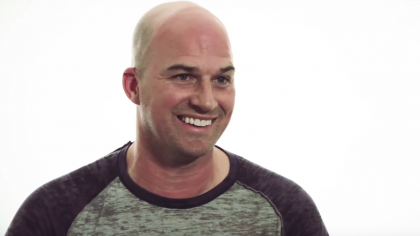Randy Alcorn's Blog, page 137
February 22, 2017
A Teenage Girl’s Response to Teen Vogue’s “Post-Abortion Gift Guide”

An angry uterus heating pad, an F-U-terus pin, a box of chocolates, a girl power hat, a coloring book of Supreme Court Justice Ruth Bader Ginsburg: these are some of the gifts recently suggested by Teen Vogue as ways that girls can show their “care” to teenage friends who just had abortions.
“The worst part of all this isn’t the procedure itself (which by the way is completely safe as long as you have access to a good clinic),” the article states. “The worst part is how you’re treated afterwards.”
“She will need a ride, she will need a hug, and she will need you—not because the act itself is so terrible, but because sometimes the world can be.”
Consider what Jesus said: “the devil…was a murderer from the beginning, not holding to the truth, for there is no truth in him. When he lies, he speaks his native language, for he is a liar and the father of lies” (John 8:44).
When Satan carries out murder in an outwardly civil society, inevitably he must bury the murder in a huge grave of lies so that no one sees the corpses. (As the mass-murderer Stalin put it, “One death is a tragedy; a million deaths is a statistic.”) As Jews and others under the Third Reich were considered subhuman, and thereby their deaths were minimized as inconsequential and necessary for the greater good, today the lives of unborn children are viewed the same.
The Teen Vogue article is flippant and lighthearted about what has devastated countless women. Every abortion leaves one person dead and one injured. This “no big deal” approach will naturally encourage pregnant readers to get an abortion themselves. There are many resources for women who are suffering the ongoing effects of their abortion—these will truly help women, not trivialize their pain.
I encourage you to watch this powerful video response from 16-year-old Autumn Lindsey. She is part of the target demographic for Teen Vogue.
Thanks for speaking up, Autumn. Thanks also to your family for encouraging you as you formed the values and convictions you articulate so well.
May God raise up more and more young people—and old people too—who are passionate about life and will oppose head on the pervasive lies that find their source in the one Jesus called “the father of lies.” May we speak out about the horrors of abortion with courage and compassion, truth and grace!
Randy
If you’d like to do more reading about how to engage people in conversation about the issue of abortion, check out my books Why ProLife? and ProLife Answers to ProChoice Arguments.
Photo: Unsplash
February 20, 2017
The Shack: Biblical Discernment Is Key in Evaluating Any Book or Movie
 The movie The Shack¸ based on the novel with the same title by Paul Young, will release on March 3. By now you have likely seen previews of the movie. Of course, in what I share below, I’m only speaking about the book—though if the movie is faithful to the book, I would expect it to have some of the same strengths and weaknesses.
The movie The Shack¸ based on the novel with the same title by Paul Young, will release on March 3. By now you have likely seen previews of the movie. Of course, in what I share below, I’m only speaking about the book—though if the movie is faithful to the book, I would expect it to have some of the same strengths and weaknesses.
I am reluctant to post this for a variety of reasons, including that I know and like Paul Young. Some years ago, when the book had sold thousands but not yet millions, I had coffee with Paul twice and we engaged in long and very civil discussions, totaling six hours or so, about various parts of The Shack, and the Bible. We agreed on most points while disagreeing on some significant ones.
Since many people have been asking me about the movie and the book, I feel obligated to say something. I have not seen the movie and have no idea whether it’s close to the book or quite different. It seems likely the movie might have some of the same strengths and weaknesses as the book. But that’s speculation. Since I have read the book, which has sold over 20 million copies, I can offer my perspectives only on it. If you see the movie you can judge for yourself what pertains and what doesn’t.
I think there’s good in The Shack. It raises the problem of evil and offers God’s love and hope to those who’ve been overwhelmed by tragedies they can’t reconcile with God’s sovereignty and goodness. There are people I respect greatly who love this book, without qualification, and consider it a great gift of God to thirsty people.
There are others I respect as much who are deeply concerned about the book’s messages, both overt and subtle, and their impact on people. In a sense, both might be right, but both need to understand the other point of view and realize that many books that are good for some people are not good for others.
I believe that those who are well grounded in the Word won’t be harmed by the weaknesses and deficiencies of The Shack. For example, a friend of mine recently emailed me about someone she knows, who has a solid Christian worldview, and who loves The Shack and finds it helpful as an allegory.
Unfortunately, increasingly few people these days are well grounded in the Word and have both the knowledge and the discernment to filter out the bad while embracing the good. That means that some people, perhaps many, will fail to recognize the book’s theological weaknesses, and therefore be vulnerable to embracing them, even if unconsciously. Sadly, I personally know some who have been led down a path of universalism through their understanding of the book and what they have heard the author say, either publicly or privately.
Please don’t get me wrong on this point: I believe in Christian fiction. It can be both true to reality and true to Scripture, honoring to God and His Word.
I’ve written novels that God has, by His grace, used to reach people who’ve not been reached by my nonfiction. The novels of C. S. Lewis and many others have had a profound positive effect on me that nonfiction can’t have, because the two are different art forms that speak to the mind and the heart in different ways. Some people oppose The Shack because they don’t believe in fiction, but that’s certainly not the case with me. There is much truth in some fiction, just as there is much error in a lot of nonfiction.
One of the major issues with the book is that it puts words in God’s mouth. In those rare instances in my fiction where I have God the Father or Jesus speak, I try to take words straight out of Scripture, and when they’re not I always make sure I have a solid biblical and theological foundation that would justify attributing those words to God. But The Shack is full of words supposedly stated by the Father, Son, and Holy Spirit. While some of those words are in keeping with what Scripture says, some of them are not.
I give specific examples in this long and detailed review, which I wrote reluctantly years ago and for a long time shared only with people who personally asked me about The Shack. It’s for those who really want to consider both the good and the bad that, in my opinion, is to be found in the book. (In his article, Tim Challies suggests that the movie version, depicting all three persons of the triune God in human form, may be inherently in violation of God’s commandments.)
Todd Wagner, pastor of Watermark Church, did a video related to The Shack. I appreciated the balance in his words. That balance is what I tried to achieve in my review (which Todd cites).
Discernment is more important than anything as we evaluate any book or movie.
The Berean Christians were commended for carefully examining, in light of the Scriptures, the teachings of the apostle Paul (see Acts 17:11). This is a man who eventually wrote thirteen inspired biblical books. How much more should we evaluate the teachings of everyone else we read, listen to, or watch.
Please begin by evaluating my words here and everywhere else in light of Scripture!
Randy
February 17, 2017
Preaching and Living Out the Gospel, Even When It’s Costly

“The Gospel” is a term we use a lot as believers. But I believe we could do more to think through what it really means, and what all it encompasses.
In its most basic and narrow sense, the Gospel is the good news of the loving, redemptive work that Christ has done and freely offers to all people, to save them from sin and Hell. The Gospel is never less than that, but it can also be viewed as more than that. In its broadest sense, with the good news of salvation remaining at the core, the Gospel is a full embodiment of the person and work of Christ in His church, and the full revelation of God’s Word. It is both declaring and living out the whole counsel of God. It is fulfilling the Great Commission—not only evangelizing, but also “making disciples” and “teaching them to observe everything I’ve commanded you” (Matthew 28:19-20).
That means being salt and light, affirming full biblical truth, and teaching a Christian worldview that deals with morality and being accountable to God for our choices. It means helping the man in the ditch that some religious people neglect (Luke 10), and feeding the poor and needy in the name of Jesus, and distinguishing sheep from goats (Matthew 25). If the church speaks the gospel message far and wide, but doesn’t intervene for the needy and the voiceless, and if we don’t teach our people to help them, then we’re not fulfilling the entire great commission, only one part of it.
Can living out the Gospel in this way be costly? Yes. I admit I roll my eyes at all the whining in the Western Church about being persecuted when we’re experiencing only a tiny taste of what God’s people have always faced, usually ten or a hundred times worse than what we’ve seen (yet). However, I do also financially support selective efforts to defend our religious liberties.
When governments shut down churches, it’s nearly always because the churches teach and live out biblical truth that the government and/or culture consider objectionable. Years ago when I was in China, even registered churches, which existed by government permission, were not allowed to preach the book of Revelation. Why? Because of its portrayal of God as the one true Lord who judges the nations, meaning that someone is infinitely above the communist government. (Or closer to home, it shows there is a Supreme Court of the triune God that stands above all judgments of nine people in DC who are called the Supreme Court.)
In our culture, sometimes it’s legal to “share the Gospel,” the good news of salvation, but occasionally it’s illegal to “live the Gospel,” the good news of following Jesus that includes advocating for the rights of abused and downtrodden people, whether that’s victims of sex trafficking, moms and babies who are abortion-vulnerable, or those imprisoned for following Jesus.
John the Baptist’s head was cut off not because he preached about Jesus, but because he preached against sin in the public arena, including the sins of Herod who married his brother’s wife, and the sins of the religious leaders and the multitudes whom he called to repentance. John the Baptist made some very strong statements and by our standards he wasn’t always “Christ-like,” but Jesus said there was no one among men greater than John.
I’ve been sued by various abortion clinics for peaceful nonviolent civil disobedience to save innocent unborn children, and to save their mothers from the horrors of abortion. Back in 1992, I was also sued by the ACLU, because I violated an ACLU-petitioned injunction, imposed by a county judge, against gathering in my home town of Gresham, Oregon, to pray on the National Day of Prayer, when we had already received permission to assemble (as many other groups do periodically) at our local city hall.
I deliberately violated the court order and called on others to do so because if we don’t hold onto such rights, they will certainly be lost. It really was no big risk for me, since in those days I used to say, “If you’re going to sue me, take a number.” The ACLU withdrew its lawsuit, perhaps because of the bad publicity it was getting—which wouldn’t have been the case had some of us been unwilling to break the law standing up for the right of peaceful assembly at a government building. (By the way, just as I’ve shared and lived the Gospel with pro-abortion advocates and abortion clinic employees, I’ve sought to do so with the ACLU.)
One important qualification on the ACLU: after researching my novel Dominion, with a theme that included racial issues, I vowed never again to say anything critical of the ACLU without commending them for what they did in the civil rights movement (not always done the right way, but resulting in just laws for which I’m profoundly thankful). So even though I oppose most of what they do today, I thank God for what liberal groups like the ACLU accomplished in the racial arena. I wrote that in an article called “Conservative, Liberal or Christian?” for which I got a lot of criticism by church people who think “Christian” and “politically conservative” mean exactly the same thing, which I do not.
Once rights are lost in the public arena, the next step is going after private citizens. For example, a few miles from our home here in Oregon, the business people who gladly sold cakes to homosexuals every week and warmly welcomed their business, but refused to decorate a cake in celebration of a gay wedding (just as they would refuse to do so in celebration of a man who they knew abandoned his wife and children and was now marrying his partner in adultery), were put out of business.
Or, as has already happened, business owners are told they must pay for insurance for their employees that covers abortions. Christian colleges have been fighting this too, and if they didn’t, they would have to either violate their consciences or close their schools. (Thankfully, Hobby Lobby won a major lawsuit that permitted them to do what they should obviously have the right to do, follow their consciences concerning the sanctity of human life!)
I know pharmacists who’ve lost their jobs for refusing to be involved in the sale of abortifacient drugs. In these people that I know personally, I see absolutely no signs of hatred for gays, adulterers, or women seeking abortions. They have enemies not because they self-righteously seek to make enemies, but because they’re humbly following Jesus, who said that we should be expected to be treated as He was: “Remember the word that I said to you: ‘A servant is not greater than his master.’ If they persecuted me, they will also persecute you. If they kept my word, they will also keep yours” (John 15:20). (Ironically, on social media I’ve seen Christians criticize these fellow believers, because the “Christ-like” critics are opposed to self-righteous judgment, though they themselves are self-righteously judging their brothers and sisters who they don’t even know.)
Churches will, I think, eventually lose many rights we have now. How quickly that will happen will depend largely on how many Christian businessmen, schools, and pastors cave in and passively agree to surrender their rights, and make those who stand up for their rights appear to be the hateful minority. The huge trick is this: how can we—with humility and Christ-centeredness and without whining—stand up for rights which assist us in getting out the Gospel message and allow our children and grandchildren to grow up with at least a fraction of the liberties we’ve always had and taken for granted?
What we really need is Christians who, like Jesus, are full of grace and truth. People with both sound doctrine and warm hearts, reaching out to all the needy in the name of Christ, no matter the cost. (Here’s something I wrote on the question of whether we’re willing to be hated for speaking and living Gospel Truth.)
Photo: Unsplash
February 15, 2017
When Our Fantasy World Distracts Us from What’s Eternally Real and Important

I’ve shared before my concerns about many believers being addicted to video games, movies, TV, and social media, which drains them of time and interest to discover the virtues and satisfaction of reading Scripture, reading good books, and practicing sustained contemplative thought about Christ and His kingdom. I have also addressed the pornography problem, which has shipwrecked countless men (and women) in our culture, and in our churches.
In this article, Erik Raymond makes some interesting points about how constantly living in a fantasy world can spiritually shipwreck men (by extension, his points apply to women, too). I want to clarify that pornography is always wrong, while video games and fantasy sports can be engaged in with moderation, in a way that is right. Still, the central point of Erik’s article stands and is well worth considering. Anything we put before God—whatever it is—is idolatry, and idolatry not only dishonors God, it also ruins us. May God deliver us from slavery to lesser things and set our thoughts on Him and His kingdom.
The Modern Man and His Fantasy World
By Erik Raymond
Every age brings its challenges for Christianity. Among them is the fact that living by faith means that we put the ultimate matters of life and existence into the hands of someone that we cannot see. In a world filled with sensory experiences faith in God is a challenge. This is nothing new of course. In the First Century, the Apostle Peter reminded his church that,
“Though you have not seen him, you love him. Though you do not now see him, you believe in him and rejoice with joy that is inexpressible and filled with glory, obtaining the outcome of your faith, the salvation of your souls.” (1 Peter 1:8–9)
It is not that a lack of sight that makes Christianity seem untenable—it just makes it different than most experiences today. Instead of having joy based upon an empirical basis we have joy through our communion with the invisible God through the portal of faith.
In recent years I have noticed a trait, particularly among men, where faith is impeded. I am talking about the cultural fixation upon fantasy. Many men today are wrapped up in a world of fantasy and also find it increasingly difficult to live by faith upon the God who is invisible.
In each of the examples below men are giving themselves to something they can see but is not real. However, with Christianity we give ourselves to something that we cannot see but is actually real. (In the following examples, I want to make clear that I believe the first is sinful but the others are not inherently so.)
Pornography
Over the last 2 dozen years pornography use has exploded. Some may call it an epidemic. Young men are being raised on it and the addiction continues through the college years and into their thirties and forties. As a pastor I don’t often go a week without hearing about somebody’s struggle in this area. Let’s think about what is happening here. Pornography attempts to enjoy the blessings of sex without the relationship of marriage. However, this is not the whole story. There is also the fact the medium for consuming it is not real, it is a bunch of images. Everything about it is a fantasy; the women, the experiences, and whatever the pleasures that come from it. It is all a fantasy. Many men are wrapped up in this sexual fantasy and it is therefore little wonder that they are distracted from a faith that is real yet unseen.
Fantasy Sports
Technological advances have made fantasy sports more accessible. For those who are unfamiliar fantasy sports are a type of online game where participants put together virtual teams of real players in a professional sport. Their teams compete against each other based upon the statistical performance of their respective players on their rosters. Each participant runs their team like an owner or general manager. In these leagues participants will track the stats over the year and award a winner at the end. Obviously playing fantasy sports is not a sin and I am not making this point. However, it is part of the overall cultural preoccupation with a fantasy world. And it is this that attends to my larger point that this fixation upon the visible but unreal tends toward making faith in the invisible but real more difficult.
Video Games
As with fantasy sports, video games are not inherently bad. However, they are a distraction from reality. Nearly 50% of Americans play at least 3 hours of games per week. It is interesting that the average age of a game player is a 35 year-old man. I understand that for many games are fun; they are something of a hobby. I also know for many the hobby can become a bit obsessive and dominating. Many people, particularly men, are caught up in playing video games for hours and hours a day. I have counseled far too many men who were spending their best hours of the day conquering worlds while their real families and real souls were being neglected.
Living in a Fantasy World
When you put these three together there is a common theme of living in a fantasy world. Pastors and church leaders attempt to encourage men to serve in the church, study God’s word, evangelize their neighbors, and step up and lead in the church. However, often times, upon pressing upon the heart, we find that men are reluctant and stagnant in their Christianity because they are thriving in a fantasy world.
Is there any wonder why there is such a decline in biblical masculinity in the church?
It is a shame that many men are far too busy conquering fake lands, looking at fake women, and winning fake championships to follow Christ’s path of self-denying, cross-bearing, service.
Pastors attempting to preach and teach God’s Word to people who are living in this world with their minds and hearts in a fictional place must be diligent. They must labor to present Christ in his surpassing glory. The Bible that condemns also convicts and converts us. We go from belittling God’s glory to broadcasting it. Christ goes from a fictional hero to a living Savior!
Perhaps you are one who is consumed by a fantasy world. If these things are crowding out or impeding your faith it is time to evaluate and make some adjustments. Perhaps there are sinful indulgences (or in the case of pornography, sinful practices) that are preventing you from growing in Christ. As is always the case the first step is prayer, confession, and repentance. Then work toward accountability and service in the local church. I can assure you that seeing the real gospel work in real people’s lives will bring a lasting joy to your soul that is incomparable by any standard. Christ is far too precious to take a back seat to anything. If we believe this then we ought to live like it.
This article originally appeared on The Gospel Coalition, and is used by permission of the author.
Photo: Pixabay
February 13, 2017
Time in God’s Word Is Not a Grim Duty

Frank Laubach (1884–1970) devoted his life to encouraging literacy around the world, with the goal that people everywhere would read the Bible. He wrote an influential pamphlet entitled “The Game with Minutes.” In it, Laubach encouraged Christians to keep God in their minds at least one second of every minute each day.[i]
Laubach wrote,
Humble folks often believe that walking with God is above their heads, or that they may “lose a good time” if they share all their joys with Christ. What a tragic misunderstanding to regard Him as a killer of happiness! A chorus of joyous voices round the world fairly sing that spending their hours with the Lord is the most thrilling joy ever known, and that beside it a ball game or a horse race is stupid. Spending time with the Lord is not a grim duty. And if you forget Him for minutes or even days, do not groan or repent, but begin anew with a smile. We live one day at a time. Every moment can be a fresh beginning.[ii]
Most days (I wish I could say all), I go to God expecting to be fed and encouraged, to be given joy and perspective. I sense God more in some moments than others, but I know He’s always with me and therefore I’m with Him. His wisdom, insight, grace, and love sometimes overwhelm me and nearly always encourage me. And if today isn’t one of those days, I don’t have to wait for tomorrow. He’s still with me as I go about my day. I can still think, pray, and meditate on Scripture even as I do other things, including—even especially—the mundane. Time with God is never wasted—it spills over into the rest of our day and colors it.
Puritan Thomas Brooks wrote:
Ah, friends, if you would but in good earnest set upon reading of the holy Scriptures, you may find in them so many happinesses as cannot be numbered, and so great happinesses as cannot be measured, and so copious happinesses as cannot be defined, and such precious happinesses as cannot be valued; and if all this won’t draw you to read the holy Scriptures conscientiously and frequently, I know not what will.[iii]
Almost four hundred years later, these words remain true. The copious happiness Brooks found in Scripture is freely available to us all—and the prospect of that happiness should draw us back to our Bibles every day.
Excerpted from Randy's book Happiness.
[i] Frank C. Laubach, The Game with Minutes (Eastford, CT: Martino Fine Books, 2012).
[ii] Brother Lawrence and Frank Laubach, Practicing His Presence (Sargent, GA: The SeedSowers, 1973), 36.
[iii] Thomas Brooks, “The Crown and Glory of Christianity,” The Complete Works of Thomas Brooks, vol. 4.
Photo: Unsplash
February 10, 2017
Trapped: A Short Film on Teen Unplanned Pregnancy
 The prolife film featured in this blog was done by I-TEC, an organization founded by my friend Steve Saint. I have seen many prolife films going back to the 70’s but found this one intriguing, interesting, very different, and uniquely powerful. It’s such an unusual length too. Most prolife films are short clips or movie length, and unfortunately, the short ones don’t allow viewers much time to experience the emotions or to ponder. This one, on the other hand, has a large amount of silence, allowing for contemplation. The fact that the air doesn’t get filled with words helps listeners draw their own conclusions based on the obvious facts.
The prolife film featured in this blog was done by I-TEC, an organization founded by my friend Steve Saint. I have seen many prolife films going back to the 70’s but found this one intriguing, interesting, very different, and uniquely powerful. It’s such an unusual length too. Most prolife films are short clips or movie length, and unfortunately, the short ones don’t allow viewers much time to experience the emotions or to ponder. This one, on the other hand, has a large amount of silence, allowing for contemplation. The fact that the air doesn’t get filled with words helps listeners draw their own conclusions based on the obvious facts.
I appreciated that the boyfriend didn’t have a change of heart, because often they don’t. But to show the dad in the photos beaming with his grandchild was precious, because when they see their grandchildren, most parents do have a change in heart. So, the film makers give hope, but they don’t make it a fairytale.
This would be a great video to share with your friends and family on social media!
February 8, 2017
Jimmy Needham on the Heart-Battle for Sexual Purity (and Other Spiritual Victories)

When it goes to fighting lust, and other besetting sins, our greatest need is for a heart transplant, a mind reprogramming, a change in our inner beings. Jesus told us why: “For out of the heart come evil thoughts, murder, adultery, sexual immorality” (Matthew 15:19–20).
When our thirst for joy is satisfied by Christ, and when the desires of our hearts are set on Him, sin becomes unattractive. We say no to the passing pleasures of sin, not because we do not want pleasure, but because we want true pleasure, a greater and lasting pleasure that can be found only in Christ. This is a critical distinction in our fight against sin, and I think Jimmy Needham explains it well in this article. Thanks, Jimmy! —Randy Alcorn
I used to look at pornography nearly every day for a decade. But for the past twelve years, by God’s grace, I have not visited a single porn site.
For many battling addiction, that sentence embodies what we’re striving for. That sentence, however, is not a success story.
As we all know by now, lust manifesting in addiction to pornography is rampant in our tech-savvy culture, and sadly it’s little different among Christians. I’m in weekly conversations with college guys at our church who are fighting hard against lust and porn addiction.
It’s interesting for me to hear how people talk about their struggle. Often when they share, they frame it in terms of “how long it’s been” since their last encounter with porn. The room rejoices with those who haven’t had an incident in a while, and we spout off advice to the ones who have. You can almost see the ranking system build before your eyes: The most recent sinner cowers on the bottom with the lowest score, while the one with the longest record of abstinence stands tall at the top.
But we may have it more wrong than we think. Why? Because our actions don’t always reveal our hearts.
Dirty Dishes
If you were looking for the most moral people of Christ’s day, you would look no further than the Pharisees — fasting, tithing, praying, obeying. Yet when Jesus has a chance to speak to them he says this:
“Woe to you, scribes and Pharisees, hypocrites! For you clean the outside of the cup and the plate, but inside they are full of greed and self-indulgence. You blind Pharisee! First clean the inside of the cup and the plate, that the outside also may be clean.” (Matthew 23:25–26)
For these religious leaders, holiness was only skin-deep. Their deeds were moral, but their hearts were evil. Jesus understood that what you could see in a person’s life often says very little about the condition of a person’s spiritual life. If God was merely after behavior modification, Jesus would have praised the Pharisees. Instead, they received some of Jesus’s harshest words of all.
One way to tell if you’re measuring success by an outer-cleanness versus an inner-cleanness is if you obsess over how many days it’s been since you last sinned. That mentality presupposes that your issue is one primarily of behavior, and not of the heart. But God always seeks a change deeper than our behavior.
Superficial Celebrations
This isn’t just a porn issue. We see this in other areas. For example, it’s not necessarily grounds for celebration if an obese person loses a hundred pounds. On a superficial level we can certainly say that proper diet and exercise is better for their health, and therefore a good thing. But is it worth celebrating if that weight loss was motivated by vanity? Or if it produced a heart of self-righteousness or self-worship? Perhaps they dealt the decisive blow to their gluttony, only to have narcissism sprout in its place. The new state of the person might be worse than the first!
The Puritan John Owen said it well when speaking on the fight against sin: “He that changes pride for worldliness, sensuality for Pharisaism, vanity in himself to the contempt of others, let him not think that he has mortified the sin that he seems to have left. He has changed his master, but is a servant still.”
Obedience from the Heart
If it’s true that God looks at the heart first, what are some markers of that inner-cleanness he desires beyond the changes in our behavior?
A sense of neediness and dependence on the grace of God. Christianity is nothing if not the religion of the helpless. The godliest thing any of us can do in our fight against sin is to admit we cannot fight against sin on our own. We need the power of the Holy Spirit working within us. If you feel defeated in your struggle against lust, let that sense of defeat push you further into the arms of your strong Savior today, and push you to lean on his strength and help, again.
A steady gaze at Christ as our treasure and satisfaction. Most of our efforts in sanctification fall short of seeing Christ this way. But Scripture is clear: There is no legitimate conquering of sin without a pursuit of Christ in its place (2 Timothy 2:22; Romans 13:14; John 6:35). Jesus is a good meal for our soul. The battle for purity is really a battle to delight in God.
Don’t mistake what I’m saying. God absolutely wants external, visible life-change: “[Christ] gave himself for us to redeem us from all lawlessness and to purify for himself a people for his own possession who are zealous for good works” (Titus 2:14). But a change of behavior is only God-glorifying if it is motivated by a change of heart.
As you war against your flesh, as you fight against lust and addiction, as you counsel others in the battle, aim higher and deeper than outer moral conformity. Feel your inability to produce lasting life change apart from the work of God’s Spirit. Pray for a heart that is so enamored with the beauty of Christ that it despises the temptations of sin. Win the inner victory with Christ’s help, and the external victories will not be far off.
This post originally appeared on DesiringGod.org . Used by permission of the author.
Photo: Pixabay
February 6, 2017
Tim Challies on Why Christian Kids Abandon Their Faith

I’ve shared before my concerns over the number of college students who are abandoning their faith in Christ. This article from Tim Challies, one of my favorite bloggers, explains some of the reasons why that happens, and what Christian parents can do to address those reasons. —Randy Alcorn
Why Christian Kids Leave the Faith
Few things are sadder to witness than people who once professed faith leaving it all behind. This is especially true when those people were raised in Christian homes by God-fearing parents. These children were given every opportunity to put their faith in Jesus but determined instead to turn their backs on him. Why would they make such a tragic choice?
Several years ago Tom Bisset carried out a study of people who had left the faith. Wanting this to be more than a statistical analysis, he actually sat down with people to interview them and ask for detailed information on when, why, and how they abandoned their faith. As he compiled his research he arrived at the four most prominent reasons that people raised in Christian homes eventually leave Christianity behind.
They leave because they have troubling, unanswered questions about the faith. Essentially, they come to doubt that Christianity offers compelling answers to the tough questions—questions related to science, suffering, sexuality, and a host of other crucial subjects. Their doubts may be intellectual or academic, theological or practical. Whatever the case, they became convinced that Christianity does not actually offer truth to those who seek it, that its answers are unreasonable, unrealistic, or just plain wrong. No longer satisfied with the answers and claims of Christianity, they opt for “intellectual honesty” and look elsewhere.
(A solution to this problem is to engage the difficult questions with our children and to show that Christianity offers a cohesive and compelling worldview that accounts for science, suffering, sexuality, and whatever else we find pressing or perplexing. We have nothing to fear from even our children’s most difficult questions.)
They leave because their faith is not working for them. Though they tried and perhaps even tried honestly and sincerely, they were not able to find the peace, joy, or meaning the Christian faith claims to offer them. Their personal experience of Christianity was never able to match what they had been taught to believe about it. Their experience was never able to match what they saw modeled by friends, pastors, or parents—people who expressed the joy and fulfillment that was theirs through a relationship with Christ Jesus. Out of discouragement they abandoned Christianity, sure its claims were exaggerated or just plain false.
(A solution here is to be vulnerable with our children, and to express that we, too, experience moments of doubt and disbelief, and that we are sometimes left wishing for answers God has not provided. We need to be careful not to oversell our faith, not to describe the Christian life as free from all difficulty. After all, the Bible emphasizes both the joys and the suffering that come to those who believe.)
They leave because they have allowed other things to take priority. For some people Christianity is outright rejected and replaced by an alternate system of beliefs. For others, though, Christianity is merely displaced by competing passions, concerns, or emphases. They may commit themselves to success in business and allow religion to take a back seat, or they may passionately pursue sports and find it more exciting and fulfilling than their faith. Some endure times of trial or torment and in the midst of those troubles find their faith has fallen by the wayside. In either case, faith, once an important part of their life, falls in significance until it fades far into the background. It’s less that these people reject their faith and more that they lose interest in it or even forget about it.
(Perhaps the solution here is for parents to emphasize the centrality of the local church to the Christian life, yet without allowing it to tip over into legalism. This community of Christians can offer children friends and mentors—even, or especially, older ones—who can supplement, complement, or even correct parental training. Children can learn that they, like their parents, need a place to belong, a place where they can both serve and be served.)
They leave because they never personally owned their faith. Sure, these people grew up going to church and they went through all the motions of personal commitments and youth groups and personal devotions. They did it all. They played the part. They convinced others and perhaps even convinced themselves. But all the while, whether they knew it or not, they were merely conforming to the desires or expectations of other people, of parents, peers, or pastors. They had never personally put their faith in Jesus Christ for salvation. When they grew sufficiently independent to make their own way in life, they gladly—or perhaps reluctantly—left Christianity behind. They left it behind because they had never personally owned it to begin with.
(A solution here is to continually preach the gospel to our children and never to assume they are saved simply because they are in a Christian home. As parents we need to regularly ask our children if they believe, to express joy when we see evidences of God’s saving grace, and to express concern when we see disobedience that may contradict their profession.)
God tells us there will always be wheat and tares. Even among children born to believing parents there will be some who reject all their parents have taught. Some of these will rebel for a while and return. Some will not. As parents we are to commit ourselves to the task of raising our children in the discipline and instruction of the Lord, to teach them the facts of the faith, to show how it answers our questions and meets our needs, to insist that the good news of the gospel must be personally apprehended. We do what God calls us to do, we do it to the best of our abilities, and we entrust the results—and our children—to God’s good providence.
Obviously Bisset’s study is not exhaustive and there are many books and studies that would offer different perspectives. Yet highlights rings true in my experience. I have seen many—too many—in each category. How about you? What do you consider the most prominent factors to explain why people abandon their childhood faith?
Photo: Unsplash
February 3, 2017
It’s Not Only Athletes: What Platform Has God Given You?
Last spring I had the privilege of speaking at a conference for NFL players put on by Pro Athletes Outreach (PAO), a group which exists to unite a community of pro athletes and couples to grow as disciples of Jesus and positively impact their spheres of influence. They have a fantastic outreach to professional football and baseball athletes and their wives. I’ve seen firsthand the amazing difference they’re making.
In the off-season I exchanged emails and texts with dozens of NFL players and chaplains I met at the conference. It was a time of great spiritual impact on many, and a large number of players and wives were baptized. Nanci and I were deeply touched by the ministry of PAO.
This video PAO made featuring Andrew McCutchen, centerfielder for the Pittsburgh Pirates, is a great reminder that God has His people everywhere, and He has given each of us a platform to use for our Lord, with our own unique sphere of influence.
Of course, many vocations are more important than baseball or football or any other sport, which for most athletes last only a short portion of their adult lives. But regardless of what vocation or position or role in a family God gives us, when God gives His people a platform to stand on, and a voice that can be heard, He expects them to represent Him faithfully. When they achieve something, whether as a farmer, factory worker, teacher, nurse, clerk, or salesperson, He calls upon them to give Him glory.
You may not have as many people watching you as pro athletes, but innumerable angels, saints and the Lord Himself are watching. No matter who you are, God has given you your physical and mental and spiritual gifts to provide you a platform from which to draw attention to Him.
But I can’t talk about sports celebrities without a reminder of gospel humility. Of course, we all like to serve from the power position. We’d rather be healthy, wealthy, and wise as we minister to the sick, poor, and ignorant. Yet when those preaching God’s Word have little personal familiarity with suffering, the credibility gap makes it difficult for them to speak into others’ lives. Our suffering levels the playing field.
Christian athletes and non-athletes alike must learn that God uses the suffering we try to avoid to spread the gospel and build His kingdom. Jesus said, “I tell you the truth, unless a kernel of wheat falls to the ground and dies, it remains only a single seed. But if it dies, it produces many seeds” (John 12:24).
People hear the gospel best when it comes from those who have known difficulty. Paul says, “To the weak I became weak, to win the weak” (1 Corinthians 9:22). Suffering creates a sphere of influence for Christ that we couldn’t otherwise have.
E. Stanley Jones wrote, “Don’t bear trouble, use it. Take whatever happens—justice and injustice, pleasure and pain, compliment and criticism—take it up into the purpose of your life and make something out of it. Turn it into testimony.”
So “whatever happens,” what are you doing to honor Christ in your own unique sphere of influence, and to give Him credit for your successes and glory in your sorrows?
If you’d like to check out some more videos from PAO, their site TheIncrease.com has some great ones. It’s also a terrific resource for church leaders and parents to find authentic sports heroes who walk with Jesus in humility and grace. If your kids or grandkids love sports, this is a great place to find athletes they can admire.
 One athlete I know and appreciate is Matt Hasselbeck, who retired after last season and is now an ESPN commentator. Here he tells his story and mentions Trent Dilfer, a Seattle Seahawks teammate, friend, and fellow ESPN commentator.
One athlete I know and appreciate is Matt Hasselbeck, who retired after last season and is now an ESPN commentator. Here he tells his story and mentions Trent Dilfer, a Seattle Seahawks teammate, friend, and fellow ESPN commentator.
Here are a couple more stories I recommend:

Jon Kitna – The World Was Mine


“So whether you eat or drink or whatever you do, do it all for the glory of God” (1 Corinthians 10:31).
By the way, I encourage you to check out Football Sunday, which is produced by The Increase. They’re offering a free, professional video presentation featuring several athletes telling their stories and sharing about faith in the NFL. Churches can sign up to use it during their services, and individuals can also show it to those gathered in their homes. One idea is to use it as a positive alternative to the halftime show on Super Bowl Sunday!
February 1, 2017
Benjamin Watson at the 2017 March for Life
The 44th annual March for Life took place last Friday, January 27 in Washington, D.C. I haven’t seen an official estimate for how many participated, but most seem to think there were hundreds of thousands of people present. How encouraging to see so many people—of various ages and races—stand up for the unborn!
One of this year’s speakers at the rally was Baltimore Ravens tight end Ben Watson. I love this brother and so appreciate his willingness to speak out on behalf of the unborn, even when it’s unpopular to some. He also speaks out often on the subject of racial justice, which is unpopular with others. (I’ve shared before about Ben’s book Under Our Skin, and you might also like to check out a forum on race and faith he’s doing with others, including Tony Dungy, on February 16.) People often are selective, embracing some justice causes and not others. I admire Ben for being consistent even though the same people who applaud him for one thing may criticize him for another. “If I were still trying to please people, I would not be a servant of Christ” (Galatians 1:10).
At the March for Life, Ben gave a great reminder that being prolife involves valuing life from conception to the grave. He also called men to lead the way in speaking up for the unborn and caring for women. I’m encouraged to see this, because abortion isn’t “just” a women’s issue. It’s a human issue, and its effects are devastating to women and men—and children—alike.
Here's Ben’s full speech.
 By the way, Ben and his wife Kirsten are the hosts for Football Sunday, which is a free, professional video presentation produced by The Increase. It features several athletes telling their stories and sharing about faith in the NFL. Churches can sign up to use it during their services, and individuals can also show it to those gathered in their homes. One idea is to use it as a positive alternative to the halftime show on Super Bowl Sunday!
By the way, Ben and his wife Kirsten are the hosts for Football Sunday, which is a free, professional video presentation produced by The Increase. It features several athletes telling their stories and sharing about faith in the NFL. Churches can sign up to use it during their services, and individuals can also show it to those gathered in their homes. One idea is to use it as a positive alternative to the halftime show on Super Bowl Sunday!
Here's the trailer.




